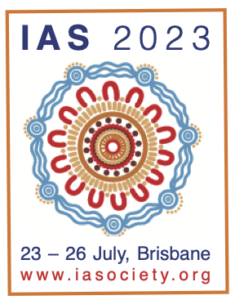Non-technical summary of articles in HTB September 2023
1 September 2023. Related: Editorial.
 These non-technical summaries explain the main issues in the September edition of HTB.
These non-technical summaries explain the main issues in the September edition of HTB.
1. EDITORIAL
This month includes mainly reports from the IAS 2023 conference held in July in Australia. This includes the use of weight loss drugs by people living with HIV.
The rest of HTB includes five short reports on recent medical papers that cover immune inflammation, cannabis use, mpox, cryptococcus and timing of ART, and CSF complications.
CONFERENCE REPORTS: IAS 2023
The articles in this issue refer to more than 65 studies presented at IAS 2023. Many of these have not been reported by other community publications.
2. Weight-loss drugs in people living with HIV.
This small study it included important data not yet presented anywhere else.
It looked at the new family of weight-loss drugs called GLP-1 agonists. This includes drugs like semaglutide (also known as Ozempic and Wegovy).
Semaglutide was only recently approved in the UK as a weight loss drug, and results are impressive.
Similar drugs have been used at lower doses for over 15 years to manage diabetes. Approval for semaglutide to lose weight was only approved in the US in 202t.
None of the GLP-1 drug studies over more than 20 years of research have been in people living with HIV. The company have no interest in HIV, even though this is a side effect of some HIV meds.
The small study at IAS 2023 reported significant weight loss in people living with HIV – about 10 kgs– even when only using the low dose to treat diabetes. This wasn’t reported for people who were HIV negative who only lost 1.7 kg.
i-Base call for more data to be reported urgently. We also report some of the new GLP-1 drugs in development.
https://i-base.info/htb/46078
3. Better treatment for children living with HIV.
An important study carried out in Uganda, Zambia and Zimbabwe/
Results showed that modern HIV meds are safer and more effective than older meds used by children.
https://i-base.info/htb/46065
4. Basic science studies including cure-related research
HIV conferences are organised by different types of research.
i-Base usually reports clinical science from conference Track B.
These are studies that your doctor would use for your care. This includes HIV drugs, side effects, treatment strategies and other related infections.
We reported an overview of Track B in the last issue.
https://i-base.info/htb/45988
In this issue we summarise studies from Tracks A, C and D.
Track A is for Basic Science which is an earlier stage of research. For example, early animal or test tube studies. Or technical details about the immune system.
12 key Track A studies included research related to immune-based treatments like bNAbs, a gene-editing study in mice, and a way to identify sleeping cells in the HIV reservoir.
https://i-base.info/htb/46151
These studies sound geeky but that are related to cure-related research and some sounded very exciting.
5. HIV and STI prevention – and human models of health care.
The Track C summary covered more than 30 studies about HIV and STI prevention, including PrEP and providing health care for different populations at risk.
https://i-base.info/htb/46127
6. Social sciences – including stigma, education, testing and social issues
The summary of Track D included the most important research into social aspects of HIV care.
For example, there were important talks about the recent anti-LGBT laws in Uganda and ways to limited the shocking discrimination that attacks human rights and imposes long prison sentences and even the death penalty now. This includes arresting people who help LGBT people or for not telling the police about them.
https://i-base.info/htb/46249
Other studies looked at stigma and the legacy of colonialism, including who gets to attend conferences and who gets to lead research.
RECENTLY PUBLISHED RESEARCH
The issue also includes several short reviews of recently published studies.
7. How defective HIV in sleeping cells can still over-activate your immune system.
8. How immune activation might also be related to structural brain changes and neurological symptoms, including dementia.
9. How cannabis might help your immune system.
A small study, but good news for some.
https://i-base.info/htb/46192
10. Timing of ART with cryptococcal infections.
Although now rare in the UK, a controversial study suggests it might be better to start meds for cryptococcal infections and HIV meds at the same time. At least for people living in higher income countries.
Please see the full online articles about all these studies.

